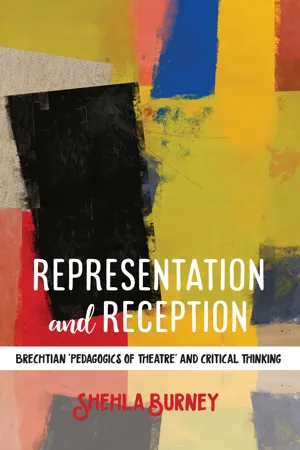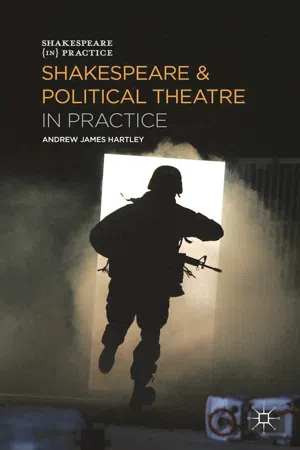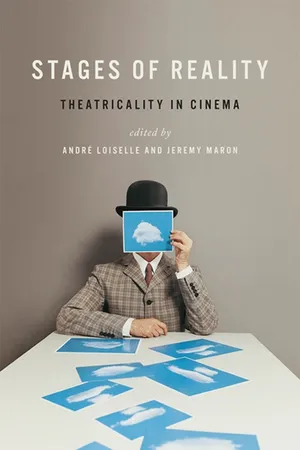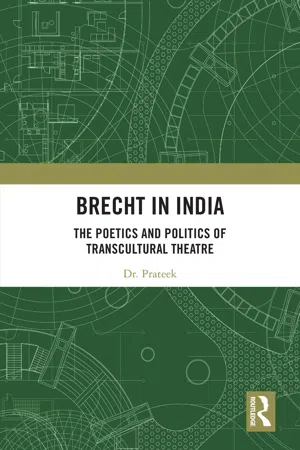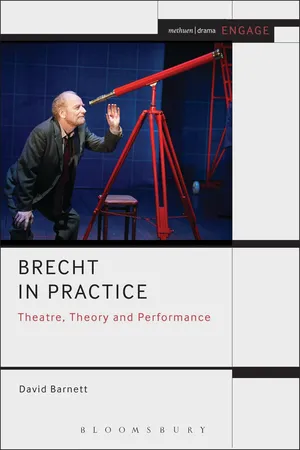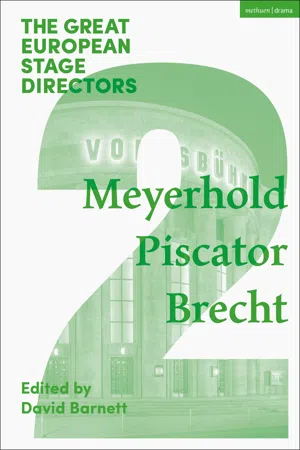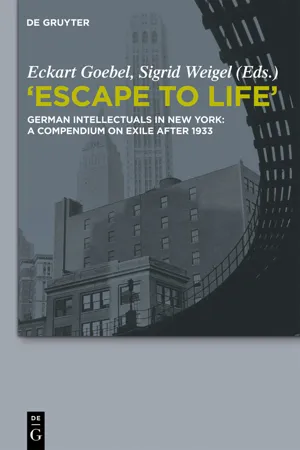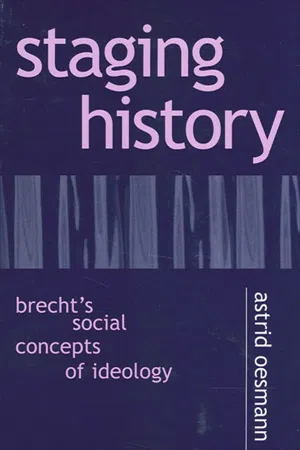Literature
Brechtian
Brechtian refers to the theatrical and literary techniques associated with German playwright and theorist Bertolt Brecht. It emphasizes the alienation effect, breaking the fourth wall, and encouraging critical thinking in the audience. Brechtian literature often features episodic structures, direct address to the audience, and a focus on social and political issues, aiming to provoke reflection and dialogue rather than emotional identification with characters.
Written by Perlego with AI-assistance
Related key terms
1 of 5
10 Key excerpts on "Brechtian"
- eBook - PDF
Representation and Reception
Brechtian 'Pedagogics of Theatre' and Critical Thinking
- Shehla Burney(Author)
- 2018(Publication Date)
(Willett, 1973, p. 70) It is this concept of independent, “individual pieces” which make up the epic form that Brechtian theatre deploys by splicing up texts, images, words, ideas, concepts into a montage of cut and paste or brisure, as Derrida calls it. Brecht’s later use of the term “dialectical theatre” is clearer as it presents the notion of building up drama by revealing the inconsistencies and contradictions in characters and soci- ety with a view to critically analyzing the social, economic and cultural processes which beget these contradictions. These dialectical contradictions rupture reality to engender complex seeing and critical thinking. The word “dialectical” describes Brecht’s praxis as he himself conceives it in light of the Hegelian and Marxist concept. Brecht declares that this is the founding principle of his writing except that like a true artist he discovered it after writing his plays: “When I read Marx’s Kapital I understood my plays … but this man Marx was the only spectator for my plays I’d ever come across” (Willett, p. 24). It is said jokingly by Brecht’s comrades that he carried the popular British humourist, P. G. Wodehouse’s books under the cover of Das Kapital! Indeed, Brecht dared to stand solidly against orthodox Marxist aesthetics as preached by Soviet Socialist critics such as Georg Lukacs BERTOLT BRECHT ’ S “ PEDAGOGICS OF THEATRE ” | 13 (1964) et al., as pointed above, in the great debate between Realism and Natural- ism (See Zammato, The Great Debate, 1984). Verfremdüngseffeckt The hallmark of Brechtian theatre is Narrative, Story, and Verfremdüngseffeckt, translated as Alienation-effect, distancing, defamiliarization, or estrangement— making the familiar strange and the strange familiar. - Andrew James Hartley(Author)
- 2013(Publication Date)
- The Arden Shakespeare(Publisher)
Brecht is a complex figure whose ideas evolved in the course of his career, and the fine points of his principles continue to be debated by critics who sometimes differ hotly over the precise meaning of crucial terms, but the general parameters of his aims and methodologies can be sketched with some clarity. 1 Brecht saw the theatrical legacy of the nineteenth century as one which privileged emotion over intellect, spectacle over critical engage-ment, and bourgeois individualism over a sense of the collective. The audience member was encouraged to be passive to such an extent that he “hands the cloakroom attendant his brain along with his coat” (Bradley 3). Such audience members lose themselves in a completely contained theatrical fiction by which their feelings are manipulated and from which they emerge much the same as they went in, if purged of those emotional excesses Aristotle deemed dangerous to social stability. Such purgation (catharsis), Brecht saw as the bleeding off of important critical energies, energies which—in a different kind of theatre—might fuel political change for the betterment of society. This new kind of theatre must escape the restrictive category of the dramatic, to which Aristotle had consigned it, in which sentiment and melodrama acted upon the emotions alone, and straddle Aristotle’s more intellectual and edifying artistic realm, the epic. Brecht’s notion of epic theatre—derived in part from Piscator who wrote about it in The Political Theatre (1929)—was an attempt to think The Politics of the Stage 13 of a mode of performance which would encourage audiences to reflect upon social structure and on the political means by which that structure was created and maintained. It aimed to contextualize character in terms of the larger social forces of economics, of ideology, and of war.- eBook - PDF
Stages of Reality
Theatricality in Cinema
- Jeremy Maron, André Loiselle(Authors)
- 2017(Publication Date)
- University of Toronto Press(Publisher)
This investigation must concern itself with the dichotomy between Brechtian theory and theatrical practice. Brechtian theory appears to encourage a dispassionate and objective consideration of events onstage on the part 2 Brechtian Television: Theatricality and Adaptation of the Stage Play BILL Y SMART Brechtian Television: Theatricality and Adaptation 31 of the spectator, while Brecht’s plays potentially involve characters and situations with which audiences can feel empathetic, emotional involve-ment. 3 This paradox can be considered through examination of the con-ventions of television drama: to what extent could audience and critical reactions to these productions be attributed to Brecht’s dramaturgy, and to what extent could reaction be attributed to the mechanisms of televi-sion adaptation? To answer this I shall present a brief explanation of the origins and intentions of Brecht’s epic theatre, and then examine these arguments through close readings of the individual productions, considering how the effects of Brechtian dramaturgy, especially the notion of the narrator as being the focal point of the play for the audience, were affected through being adapted for television production, mediated to a domestic audience through cameras. The Epic Theatre Brecht’s conception of the epic drama was based on a series of polarities, defined in opposition to what it was not. Brecht suggested that many people would initially understand ‘epic theatre’ to be a contradictory term, between two different forms of narrative; the epic, as deriving from a bardic, oral and written tradition of storytelling while the dramatic was understood as deriving from the linear, Aristotelian tradition of the theatrical play. Brecht thought that the bardic tradition of storytelling, going back to Homer, was based around the performance of stories through narration, the process of storytelling in itself being inherently dramatic for the listener. - Peter Brooker, Peter Widdowson(Authors)
- 2014(Publication Date)
- Routledge(Publisher)
petit-bourgeois morality: problems of conduct, and no longer of action, arise. Here is where Brecht can have a great cleansing power, a pedagogical power.Especially since his morality has nothing catechistic about it, being for the most part strictly interrogative. Indeed, some of his plays conclude with a literal interrogation of the public, to whom the author leaves the responsibility of finding its own solution to the problem raised. Brecht's moral role is to infiltrate a question into what seems self-evident (this is the theme of the exception and the rule). For what is involved here is essentially a morality of invention. Brechtian invention is a tactical process to unite with revolutionary correction. In other words, for Brecht the outcome of every moral impasse depends on a more accurate analysis of the concrete situation in which the subject finds himself: the issue is joined by representing in explicit terms the historical particularity of this situation, its artificial, purely conformist nature. Essentially, Brecht's morality consists of a correct reading of history, and the plasticity of the morality (to change Custom when necessary ) derives from the very plasticity of history.Literature and Signification
What is theater? A kind of cybernetic machine. When it is not working, this machine is hidden behind a curtain. But as soon as it is revealed, it begins emitting a certain number of messages. These messages have this peculiarity, that they are simultaneous and yet of different rhythm; at a certain point in the performance, you receive at the same time six or seven items of information (proceeding from the set, the costumes, the lighting, the placing of the actors, their gestures, their speech), but some of these remain (the set, for example) while others change (speech, gestures); what we have, then, is a real informational polyphony, which is what theatricality is: a density of signs (in relation to literary monody and leaving aside the question of cinema). What relations do these counterpointed signs (i.e., at once dense and extensive, simultaneous and successive) have among themselves? They do not have the same signifiers (by definition); but do they always signify the same thing? Do they combine in a single meaning? What is the relation which unites them during an often very long interval to that final meaning which is, one may say, retrospective, since it is not contained in the last speech and yet is not clear until the play is over? Further, how is the theatrical signifier formed? What are its models? We know that the linguistic sign is not 'analogical' (the word 'cow' does not resemble a cow), it is formed by reference to a digital code; but what about the other signifiers - let us call them, for simplicity's sake, the visual- eBook - ePub
Brecht in India
The Poetics and Politics of Transcultural Theatre
- Dr. Prateek(Author)
- 2020(Publication Date)
- Routledge(Publisher)
In light of Barnett’s definition, one can see in the Indian context that indigenous traditions are invoked in Brechtian productions to demonstrate to the audiences the dialectics 33 of the world rather than with the primary agenda of preserving indigenous theatrical traditions. This strategy of using indigenous material stands in contrast to the Roots movement, 34 wherein the writer returns to the indigenous traditions to regain his “Indianness” and in the process preserve these traditions. Indigenous traditions incorporated into Brechtian productions in India are not produced primarily for the entertainment of urban audiences, but to impel the audience towards critical analysis through alienation effects. 35 They are not designed to make the urban audiences nostalgic, but to make them reflect. Multi-linguistic narratives By mixing languages or dialects, Brechtian production highlights India’s diversity. Brechtian performance cuts across linguistic lines to bridge the gap that divides Indian theatre into communal groups. Linguistically, Brechtian productions remain closer to Parsi theatre, recognized for its “high incidence of multilingualism” (Hansen 384), than the Theatre of Roots, which failed to acknowledge the fluidity of Indian languages. Unlike the Roots movement, which remained Hindi-centric, Brechtian productions are performed in Hindustani (a mix of Hindi and Urdu) or in regional languages. The use of regional variants of a standard language or the mixing of two languages can force audiences to reflect critically on the socio-economic conditions of people who engage with a different dialect or language. Thus, the third characteristic of Brechtian theatre is its ability to emulate the cultural diversity of India and its performance traditions - eBook - PDF
Brecht in Practice
Theatre, Theory and Performance
- David Barnett, Enoch Brater, Mark Taylor-Batty, Enoch Brater, Mark Taylor-Batty(Authors)
- 2014(Publication Date)
- Methuen Drama(Publisher)
Brecht in Practice 110 of figure over character and the sense that each figure is built on its relationships with other figures and its place in society. The work of the actor, then, is to accommodate these fundamental understandings in a production without Brecht imposing particular ways of representing them. Brecht did not engage with anything as formalized as ‘actor training’; a better term would be ‘actor sensitization’. Once actors were sensitized to Brecht’s dialectical worldview, they could find the most appropriate ways to perform their roles. In short, acting, like the different elements involved in staging plays discussed in Chapter 4 ( Fabel , Arrangement , Gestus and Haltung ), is always to be seen in the context of Brecht’s method: the dialectical interpretation of dramatic material. Thus, the actor does not exist independently of the method by exhibiting a ‘Brechtian style’ . Instead, it is the method, the way of approaching the representation of reality, that asks certain questions of the actor, and the actor’s performance will respond to the different challenges of different texts, rather than conform to a ‘Brechtian style’. The chapter is thus concerned with the ways in which Brecht seeks to sensitize the actor to certain ways of interpreting reality rather than establishing and fixing a characteristic style of performance. Brecht and casting, or: Cleaving the actor from the role As should be evident from the previous chapters, a theme that runs through Brecht’s ideas about theatre is that of difference. Difference presents a productive means of activating an audience: it is provocative to spectators because (at least) two disparate elements are presented to them, and they have to make sense of the discrepancy. Brecht finds that the actor can serve as a site of difference, too. In order to understand his reasoning, it is necessary to appreciate an important - eBook - PDF
The Great European Stage Directors Volume 2
Meyerhold, Piscator, Brecht
- David Barnett(Author)
- 2021(Publication Date)
- Methuen Drama(Publisher)
Bertolt Brecht Bertolt Brecht (1898–1956) was a towering figure of twentieth-century culture. He made significant contributions to playwriting, poetry, the theory of theatre-making, and directing, among other things. Yet while many volumes have been written on his plays, poems and theories, relatively little work has been done on his work as a director and theatre practitioner. This is both understandable and surprising. On the one hand, published texts can endure far longer than theatre productions that may achieve great success in performance but be surpassed or forgotten as time moves on. On the other, the Berliner Ensemble (BE), the company Brecht co-founded with his wife, Helene Weigel, in 1949 was internationally celebrated from the mid-1950s, and Brecht insisted that its work, in rehearsal and on stage, be documented to serve as a model for other theatres. This chapter examines how Brecht approached directing three different genres of play, a comedy, a propaganda piece and a tragedy. In each case, Brecht took over direction from another director, twice without credit. An examination of these three productions allows insights into the conditions under which Brecht felt compelled to intervene and reveals how he responded to the more conventional fare the original directors were offering the actors and potentially the audience. This contrast will shed light not only on Brecht’s aims for the theatre but the means by which he sought to realize them. First, however, I will outline Brecht’s development as a director 5 Brecht as Corrector: Directing Away From Conventional Theatre David Barnett MEYERHOLD, PISCATOR, BRECHT 134 in the decades preceding the BE’s foundation in order to show how he later modified and challenged certain ideas that emerged early in his practice. Early seeds of directing practice Brecht’s engagement with theatre practice started when he was in his teenage years. - eBook - PDF
"Escape to Life"
German Intellectuals in New York: A Compendium on Exile after 1933
- Eckart Goebel, Sigrid Weigel, Eckart Goebel, Sigrid Weigel(Authors)
- 2012(Publication Date)
- De Gruyter(Publisher)
Bertolt Brecht, Joseph Losey, and Brechtian Cinema Robert Cohen Let me begin by evading the question of what might constitute a Brech-tian Cinema. Instead, and as a way of approaching the topic obliquely, I will ask the easier question of who is considered or considers himself or herself a Brechtian filmmaker. This narrative begins in the mid-1950s when the Berliner Ensemble presented Brecht’s own staging of Mother Courage, The Caucasian Chalk Circle , and The Mother in Paris. Among the spectators were Roland Barthes and Bernard Dort, friends and co-editors of the journal The´a ˆtre populaire . 1 With their enthusiastic reviews and es-says, some of them written together, they laid the groundwork for Brecht’s international fame. Picking up on the title of one of Barthes’s essays, “Les taches de la critique brechtienne,” Dort wrote an article en-titled “Pour une critique Brechtienne du cine ´ma.” It was published in December of 1960 in Cahiers du cine´ma , 2 self-proclaimed cradle (“ber-ceau” 3 ) of the New Wave, in an issue dedicated to Brecht. In the same issue, the critic Louis Marcorelles deplored the fact that the young direc-tors of the nouvelle vague – he specifically mentions Jean-Luc Godard – ignored Brecht and his revolutionizing work in the theatre. 4 Within a few years some of those new directors, foremost among them Godard himself, would become – and remain to this day – the ultimate Brechtian filmmakers. It was through their films and thus via the New Wave that Brechtian Cinema arrived in West Germany, 5 where it would be 1 See Meyer-Plantureux, Chantal, Bernard Dort: Un intellectuel singulier , Paris 2000, 95f. and 104ff. 2 Dort, Bernard, “Pour une critique brechtienne du cine ´ma,” in: Cahiers du cine´ma 19.114 (1960): 33–43. 3 Marcorelles, Louis, “D’un art modern,” in: ibid., 44–53, 44. 4 Ibid., 44f. 5 See Brady, Martin, “Brecht and Film,” in: Peter Thomson/Glendyr Sacks (ed.), The Cambridge Companion to Brecht , Cambridge 2 2006, 297–317, 309. - eBook - PDF
The Modern Restoration
Re-thinking German Literary History 1930-1960
- Stephen Parker, Peter Davies, Matthew Philpotts(Authors)
- 2012(Publication Date)
- De Gruyter(Publisher)
Subsequent reference, p. 87. 42 Meg Mumford, 'Brecht Studies Stanislavsky: Just a Tactical Move?', New Theatre Quarter-ly, 11 (1995), 241-58. 43 Jan Knopf, Brecht Handbuch: Eitle Widersprüchliche Ästhetik , 2 vols (Stuttgart: Metzler, 1980), I: Theater , p. 466. 44 See Matthew Philpotts, 'Aus so prosaischen Dingen wie Kartoffeln, Straßen, Traktoren, werden poetische Dinge!: Brecht, Strittmatter, and Sinn und Form', German Life and Tetters, 56 (2003), 56-71. 286 Bertolt Brecht Finally, if we look more closely at the terms of the cultural-political controversies in which Brecht became involved, it is clear that the formalism-realism dichotomy as it was constructed in SED cultural policy does not accurately describe the position which Brecht himself sought to occupy. Central here are the collection of short texts written by Brecht in response to the initiation of the Formalism Campaign in 1951 and his involvement in it through the Lukullus project. In these private notes, Brecht sets out a consistent position which locates him somewhere between the artificially constructed poles of formalism and realism. On the one hand, Brecht defends the significant role played by 'form' in art — 'sie ist nicht alles, aber sie ist doch so viel, daß Vernachlässigung ein Werk zunichte macht' (BB, 23, 144) — and resolutely maintains the necessity of formal innovation: 'Ohne Neuerungen formaler Art einzuführen, kann die Dichtung die neuen Stoffe und neuen Blickpunkte nicht bei den neuen Publikumsschichten einführen' (BB, 23, 145). On the other, this is an emphasis on form which is intimately connected to, indeed derived from, content: 'Nur die neuen Inhalte vertragen neue Formen' (BB, 23, 147). Thus, Brecht's interest in formal innovation in the GDR stems from a need to represent the new subject-matter of post-war German socialism, and as such it is in Brecht's terms a realist undertaking. - eBook - PDF
Staging History
Brecht's Social Concepts of Ideology
- Astrid Oesmann(Author)
- 2012(Publication Date)
- SUNY Press(Publisher)
Mimesis, as carnal knowledge com- bined with intentional estrangement through theatrical space, makes for a specifically Brechtian form of dialectics. Brecht’s dialectical theatre pro- duces a “Kräftefeld der widersprechenden Interessen” (21:512–13) (field of forces of contradictory interests) in which a critique of the mimetic activity can take place. Brecht’s reappropriation of mimesis in a defamiliarized theatrical set- ting repeatedly undermines any consistent ideological message. Two very different scholars make complementary observations in this regard. On the semantic level, Hans Mayer notes that one of the most challenging aspects of Brecht’s Marxist theatre is the tenderness with which he explores the betrayal of revolutionary projects. On a semiotic level, Roland Barthes notes that Brecht’s theatre rehearses that which it actually attacks. It caresses ideology by adding history rather than using one ide- ology to demolish another or to shape history. 45 Brecht and Theory By following Adorno’s concept of mimesis as an antidote against projections and as the adaptation to the other, Brecht engages in what he called his loving intimacy with treason, which leaves many who long for final answers frustrated. On the other hand, this sort of corruption makes Brecht the powerful social critic that he remains in the postcom- munist world. 46 Staging History
Index pages curate the most relevant extracts from our library of academic textbooks. They’ve been created using an in-house natural language model (NLM), each adding context and meaning to key research topics.
